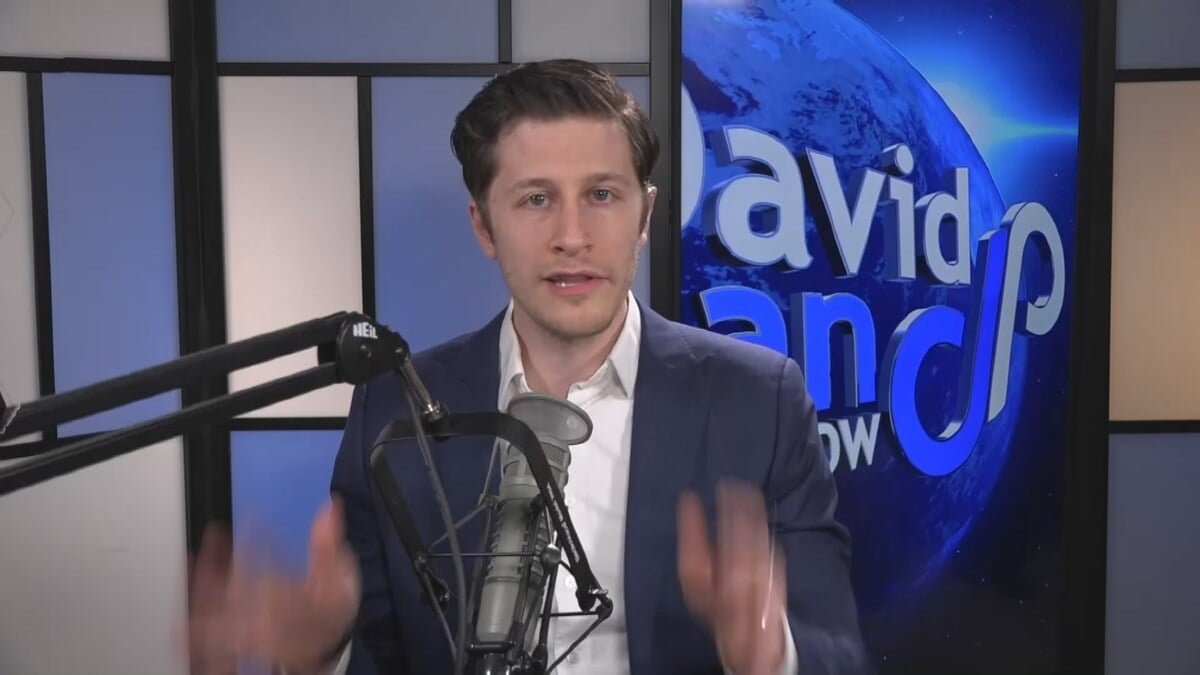If you ever find yourself sitting next to David Pakman on a plane, I promise you he won’t talk your ear off. He’s a man that chooses his words carefully.
Pakman also seems like a guy that doesn’t suffer fools gladly and always seems to be doing something constructive.
There was a podcast in 2020 which I viewed on YouTube to prepare for our talk, where Pakman was on the Joe Rogan Experience. I was surprised to find it remarkably civil and informative.
“I’ve been on his show twice,” Pakman said. “We exchanged a few messages before I appeared the first time, and I think he’d been aware of my work. It wasn’t a surprise to me when it turned out to be a good exchange.”
Pakman said in his dealings with Rogan, he found him open-minded, and he listened to Pakman’s thoughts. “That has changed a bit in the past couple of years,” he said. “Since my second appearance, he’s been repeating right-wing bullet points; there has been more disagreement.”
Pakman, the eldest of three kids, was born in Buenos Aires, then the family moved to Massachusetts. He later attended the University of Massachusetts Amherst. He earned his MBA at Bentley College and was an adjunct professor at Boston College.
The David Pakman Show started as a community radio show in the basement of WXOJ. The reason he first stopped by the campus’ radio station stemmed from boredom. “You only had to sign up, and you were in,” Pakman said.
He has nearly 1.5 million subscribers on YouTube and is just short of 1.2 billion views.
Pakman said he realizes he’s privileged and fortunate; some might say lucky to have gotten into the career and current job. “In graduate school, I didn’t know what I was going to do. While doing my show, I talked to a lot of my classmates who went into finance and banking. I knew I didn’t want to do that.”
Radio was becoming more interesting to Pakman. He decided to take a year to pursue the ‘radio thing.’ “Earlier in my career, our audience was a fraction of what it is now,” Pakman said. “Then a radio consultant asked me how much politics was important to me or if I just wanted to be on the radio.”
The consultant suggested Pakman could quickly get a syndicated show earning $250K if he became a Right-winger on the radio. Pakman passed on that notion.
Pakman’s show was doing well when he moved to New York in 2013. “I took on the expenditures with the studio, and things started to grow,” Pakman said.
The show became more popular and more profitable, even with the additional expenses. I figured if I could make it in New York, I could make it anywhere.”
The world has drastically changed since Pakman entered the radio business. I asked him if it had to be as combative as it is today?
“It’s hard to boil down the vast problems into narrow things,” he said. “It’s a combination of a few factors in the United States. Things are worse than they have to be because a lot of people in this country don’t value an education.”
Pakman said there’s also a lack of critical thinking. “You have to teach kids that kind of thought process when they’re 10-12 years old. Just because something is on Facebook doesn’t make it factual.”
The Right-wing thinking is incredibly strong, Pakman says, because it’s being monetized very well.
“Legalized abortion is approved by two-thirds of the country. The people who are against abortion raise crazy amounts of money to combat the procedure.”
Pakman suggested too much-uninformed ignorance is taken advantage of by Republicans. “Even after the 2020 election, recounts and audits, they still claimed it was stolen. If you look at the fine print on Trump’s ads, you’ll see a disclosure that says a good chunk of the money raised goes towards Trump’s personal campaign debts.”
Pakman explained that latent extremism is part of a perfect storm. Pakman also said Trump bellowed things people couldn’t say out loud before he came on the scene.
“There’s a cultish nature to Trumpian beliefs,” Pakman said. “Fifty-seven percent of Republicans said in the aftermath of the 2020 election Trump was actually the winner. Some may believe it literally, but others may be saying it to show they are part of the ‘team.’”
The utter hatred and loathing of Hillary Clinton has long been a puzzlement to some.
“She wasn’t the most likable person. So, that wasn’t a great start for her,” Pakman said. “Political races are popularity contests. In addition, the Right has this sort of mechanism. They’re immune to their own tactics being turned against them. If you reminded them of a lot of stuff they were throwing at Hillary, you’d have to believe some of it was misogynistic.”
Is there a reason to be frightened of the future of politics, regardless of what ‘side’ you’re on?
“I’d say there is a reason,” Pakman said. “There’s a lot of scary stuff going on. Writer Thomas Homer-Dixon said by 2030; we could be a Right-wing dictatorship. Norms are not what we’ve known. The frog doesn’t realize it’s burning in the boiling pot of water.” Pakman said we just don’t converse anymore. “I’m worried about that. We’re not developing skills for learning to think.”
When he’s not up to his neck in politics and the strife of the world, Pakman said he likes to travel. He’s recently taken trips to Spain and the West Coast.
“The world is so toxic; I take three days off each week. And just disconnect from everything,” Pakman explained. “I keep my phone on in case someone calls, but I really try to escape.”
According to Pakman, there’s basically a couple of different components to the structure of talk radio.
“It started with the religious Right and churches,” Pakman said. “They were on low-powered FM stations.” He said the Right takes advantage of deceptively simple topics. “They’ll tell you taxation is theft, and you have a right to lesser taxes. Democrats don’t say taxes should be as high as possible, as the Right would want you to believe. We agree cities should have fire departments and public schools, but some choose to believe funding for them shouldn’t be provided.”
Reading is a source of rejuvenation for Pakman. He said people always ask him on his show what he’s currently reading.
Just in case you were wondering:
“I’m finishing Kim Stanley Robinson and his trilogy on Mars. I also like to read Hemingway, Dostoyevsky, even Bret Easton Ellis.”
Radio listeners have strong opinions on hosts. Some are more forceful on the air; others tend to be more subtle.
“I’ve met so many media people on both the Left and Right,” Pakman said. “Some of the worst experiences I’ve had, no names mentioned, are with people on the Left. People that won’t give you the time of day. People I’ve met on the Right have been kind and accommodating.”

Jim Cryns writes features for Barrett News Media. He has spent time in radio as a reporter for WTMJ, and has served as an author and former writer for the Milwaukee Brewers. To touch base or pick up a copy of his new book: Talk To Me – Profiles on News Talkers and Media Leaders From Top 50 Markets, log on to Amazon or shoot Jim an email at jimcryns3_zhd@indeedemail.com.






